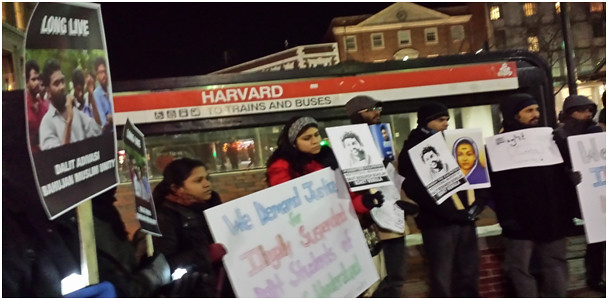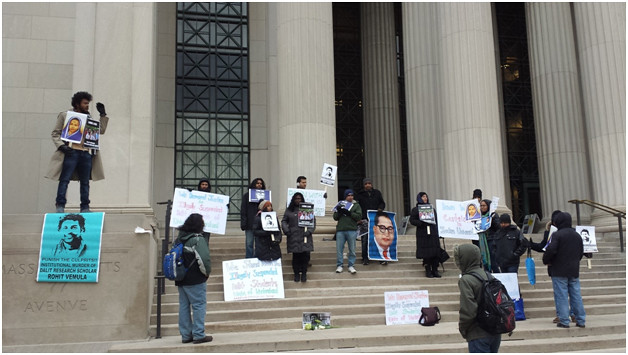By TCN News,
Boston: Protests have erupted at major universities and cities across the US and elsewhere, expressing shock and outrage at the death of 26-year old Rohith Vemula, an anti-caste activist, student leader and PhD scholar at the University of Hyderabad (UoH) on January 17, 2017.
On Friday January 22, Indian civil society groups based in the US gathered at Harvard Square, Cambridge for the second time in two weeks to demand punishment for those responsible for the student’s death. The previous Friday, a protest against the suspension of 5 Dalit student leaders at the UoH attracted about 35 participants at Harvard Square. The following Monday one of the five suspended students, Vemula, committed suicide.

Students Protesting For Justice for Rohith Vemula at Harvard Square, Cambridge
Vemula’s death has resulted in widespread protests with analysts terming this an “epochal” moment for India’s students similar to the #BlackLivesMatter and #RhodesMustFall movements. On January 25th, 2016 hundreds of activists stormed the UoH campus and organized large demonstrations.
Meanwhile, protests outside India calling for punishment of culprits gained momentum with demonstrations outside the Indian Consulate in San Francisco, at Harvard University, Massachusetts Institute of Technology, and at the University of Michigan. Large protests have also taken place in London. Two more are planned on January 30 in Washington DC by the International Commission for Dalit Rights and in New York City by Ambedkar International Mission. A condolence meeting is also planned on Wednesday January 27 outside the Indian Embassy in Rome, Italy. Over 150 academics in the US have signed a letter condemning caste discrimination on Indian campuses. In response to escalating concerns about campus discrimination in India, Harvard University is organising a solidarity meeting and discussion to highlight Vemula’s death.
Political Pressure and Caste Discrimination
Vemula’s death has been linked through a chain of emails to direct pressure by two Central Ministers of the ruling Bharatiya Janata Party (BJP) on the university Vice Chancellor (VC) Appa Rao. The scholar’s death has turned into a major firestorm for Prime Minister Narendra Modi’s government with mass demonstrations across the country demanding the criminal prosecution of the two ministers and the VC under India’s anti-discrimination laws. Last week, a major speech by PM Modi was disrupted by Dalit students chanting slogans calling for justice for Rohith.
Tensions between Akhila Bharatiya Vidyarthi Parishad (ABVP) – the student wing of the Hindu nationalist sister organisation of the ruling BJP, Rashtriya Swayamsevak Sangh (RSS), and Ambedkarite and minority student groups have increased sharply in public Indian educational institutions in the past years. This is partly because of the caste and class discrimination faced by marginalised students’ in elite educational spaces and their political organising and assertion against Brahminism and Hindu nationalism. Meanwhile, administrative staff and teachers in top universities remain almost exclusively from the “upper castes” and Hindus resulting in an often hostile climate for Dalit and minority students. Elite universities have seen a slew of Dalit student suicides in the past 10 years often after students complain about severe discrimination by their professors, advisors, and administration.
Vemula’s death shot into national prominence because of involvement of Central ministers, the public harassment and intimidation of Rohit and his fellow Dalit students, and two powerful letters written before his death that have since gone viral on social media. In a letter to the VC Appa Rao a month before his death, Vemula asks him to provide Dalit students with poison and a rope as soon as they gain admission or arrange for them to be euthani sed in order to solve the “Dalit problem” on campus. A month after receiving no response from administration Vemula, an aspiring science writer, committed suicide leaving behind a poignant suicide note that laments society’s inability to look beyond people’s most immediate identities – a reference to casteism.
Outrage in Cambridge
Dr. Vidya Karunakaran, a PhD from Dartmouth College who works with #DalitWomenFight expressed anguish at the loss of the promising young scholar and activist. Noting that his death was part of a larger pattern in Indian universities, she said. “80% of suicides in the elite institutions in India are Dalits and Adivasis. Clearly we have a problem of casteism in our State”.
Dalit student Suraj Yengde, Associate at the Harvard African American Department and a PhD scholar from South Africa compared casteist India to apartheid South Africa and to the situation of the Palestinians. He noted that all systems of oppressions carry within them a “genocidal tendency” which make it difficult for oppressed groups to live.
Tanoj Meshram, a PhD student in Social Policy at Brandeis University and Central Executive Committee Member and International Coordinator of Mulnivasi Sangh (an offshoot of the All India Backward and Minorities Communities Employees Federation) accused educational institutes in India of denying political and civil rights supposed to be guaranteed by the constitution. He said “educational institutes are supposed to be instruments of social change…but in India it is shameful to see that they are citadels of the status quo and Brahmanism.”
Protesters called for the immediate sacking and criminal prosecution of the two union ministers – Central Labor Minister Bandaru Dattatreya, and Minister for Human resources Ms. Smriti Irani – and the VC of UoH for their role in Vemula’s death. Organisers are working on presenting a memorandum to the United Nations to call for a Special Rapporteur on Caste Atrocities and to constitute an independent working group to assess the conditions affecting the victims of the caste system SCs/STs/OBCs and specifically SC and STs who face untouchability and severe oppression based on their social origins.

Students protesting at Massachusetts Institute of Technology for Rohith Vemula
The organizers, which included Boston Study Group; Ambedkar International Center; Ambedkar International Mission; Ambedkar Association of North India; Alliance for a Secular and Democratic South Asia; Association for India’s Development; issued a joint statement. “We mourn the loss of a talented, sensitive, and powerful young Ambedkarite and scientist and extend our deep condolences to his family, loved ones, and to the Ambedkarite student community at UoH. We condemn the open support by UoH administration of extreme right wing groups like the RSS affiliated ABVP who have been carrying out a campaign of terror to intimidate progressive forces in society by using BJP’s political networks to protect their cadre and persecute democratic opposition. Rohith’s death is a direct consequence of this right wing persecution in partnership with the casteist and corrupt university administration,” the statement said.
The organisers called on other South Asian and human rights groups to join the protest and said “We express our solidarity with the Bahujan and Religious Minorities student resistance movements across all other casteist university spaces in India.”

